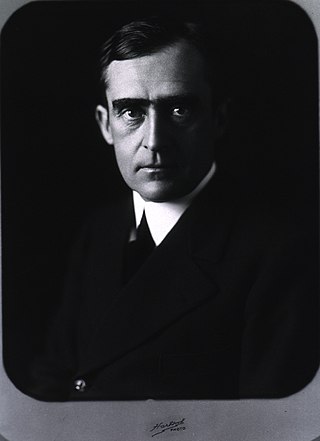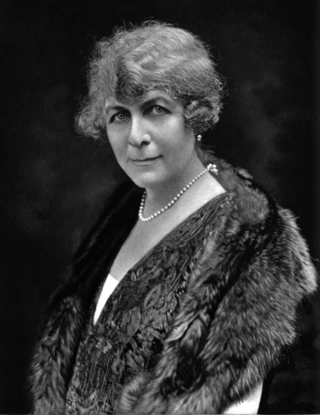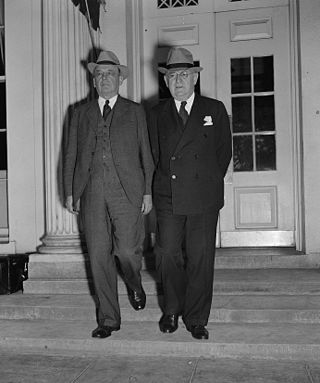
Thomas Woodrow Wilson was an American politician and academic who served as the 28th president of the United States from 1913 to 1921. A member of the Democratic Party, Wilson served as the president of Princeton University and as the governor of New Jersey before winning the 1912 presidential election. As president, Wilson changed the nation's economic policies and led the United States into World War I in 1917. He was the leading architect of the League of Nations, and his progressive stance on foreign policy came to be known as Wilsonianism.

The 1916 United States presidential election was the 33rd quadrennial presidential election, held on Tuesday, November 7, 1916. Incumbent Democratic President Woodrow Wilson narrowly defeated former associate justice of the Supreme Court Charles Evans Hughes, the Republican candidate.

Newton Diehl Baker Jr. was an American lawyer, Georgist, politician, and government official. He served as the 37th mayor of Cleveland, Ohio from 1912 to 1915. As U.S. Secretary of War from 1916 to 1921, Baker presided over the United States Army during World War I.

William Gibbs McAdoo Jr. was an American lawyer and statesman. McAdoo was a leader of the Progressive movement and played a major role in the administration of his father-in-law President Woodrow Wilson. A member of the Democratic Party, he also represented California in the United States Senate.
Thomas Andrew Bailey was a professor of history at his alma mater, Stanford University, and wrote many historical monographs on diplomatic history, as well as the widely used American history textbook, The American Pageant. He was known for his witty style and clever terms he coined, such as "international gangsterism." He popularized diplomatic history with his entertaining textbooks and lectures, the presentation style of which followed Ephraim Douglass Adams. Bailey contended foreign policy was significantly affected by public opinion, and that current policymakers could learn from history.

The American Political Science Association (APSA) is a professional association of political science students and scholars in the United States. Founded in 1903 in the Tilton Memorial Library of Tulane University in New Orleans, it publishes four academic journals: American Political Science Review, Perspectives on Politics, Journal of Political Science Education, and PS: Political Science & Politics. APSA Organized Sections publish or are associated with 15 additional journals.

Cary Travers Grayson was a surgeon in the United States Navy who served a variety of roles from personal aide to President Woodrow Wilson to chairman of the American Red Cross.

Between 73 and 79 days after the presidential election, the president-elect of the United States is inaugurated as president by taking the presidential oath of office. The inauguration takes place for each new presidential term, even if the president is continuing in office for a second term.

Jackson-Reed High School is a public high school in Washington, D.C. It serves grades 9 through 12 as part of the District of Columbia Public Schools. The school sits in the Tenleytown neighborhood, at the intersection of Chesapeake Street and Nebraska Avenue NW. It primarily serves students in Washington's Ward 3, but nearly 30% of the student body lives outside the school's boundaries.

Florence Jaffray "Daisy" Harriman was an American socialite, suffragist, social reformer, organizer, and diplomat. "She led one of the suffrage parades down Fifth Avenue, worked on campaigns on child labor and safe milk and, as minister to Norway in World War II, organized evacuation efforts while hiding in a forest from the Nazi invasion." In her ninety-second year, U.S. President John F. Kennedy honored her by awarding her the first "Citation of Merit for Distinguished Service." She often found herself in the middle of historic events. As she stated, "I think nobody can deny that I have always had through sheer luck a box seat at the America of my times."

Louis Brownlow was an American author, political scientist, and consultant in the area of public administration. As chairman of the Committee on Administrative Management in 1937, he co-authored a report which led to passage of the Reorganization Act of 1939 and the creation of the Executive Office of the President. While chairing the Committee on Administrative Management, Brownlow called several of President Franklin D. Roosevelt's advisors men with "a passion for anonymity"—which later became a popular phrase.

The second inauguration of Woodrow Wilson as president of the United States was held privately on Sunday, March 4, 1917, at the President's Room inside the United States Capitol in Washington, D.C., and publicly on Monday, March 5, 1917, at the East Portico of the Capitol. This was the 33rd inauguration and marked the commencement of the second and final four-year term of both Woodrow Wilson as president and Thomas R. Marshall as vice president. Chief Justice Edward D. White administered the presidential oath of office to Wilson.

The inauguration of Warren G. Harding as the 29th president of the United States was held on Friday, March 4, 1921, at the East Portico of the United States Capitol in Washington, D.C. This was the 34th inauguration and marked the commencement of Warren G. Harding's only term as president and of Calvin Coolidge's only term as vice president. Harding died 2 years, 151 days into this term, and Coolidge succeeded to the presidency.

Joseph Ruggles Wilson Sr. was a prominent Presbyterian theologian and father of President Woodrow Wilson, Nashville Banner editor Joseph Ruggles Wilson Jr., and Anne E. Wilson Howe. In 1861, as pastor of First Presbyterian Church in Augusta, Georgia, he organized the General Assembly of the newly formed Presbyterian Church in the United States, known as the Southern Presbyterian Church, and served as its clerk for 37 years.

Byron Rufus Newton was an American journalist, political figure, early aviation promoter, and author of satirical poetry. He was the publicity director of Woodrow Wilson's presidential campaign in 1912, and served as Collector of the Port of New York from 1917 to 1921.
Woodrow Wilson appointed three Associate Justices to the Supreme Court of the United States, James Clark McReynolds, Louis Brandeis, and John Hessin Clarke.
This bibliography of Woodrow Wilson is a list of published works about Woodrow Wilson, the 28th president of the United States. For a more comprehensive listing see Peter H. Buckingham, Woodrow Wilson: A bibliography of his times and presidency.

Even before women's suffrage efforts took off in Rhode Island, women were fighting for equal male suffrage during the Dorr Rebellion. Women raised money for the Dorrite cause, took political action and kept members of the rebellion in exile informed. An abolitionist, Paulina Wright Davis, chaired and attended women's rights conferences in New England and later, along with Elizabeth Buffum Chace, founded the Rhode Island Women's Suffrage Association (RIWSA) in 1868. This group petitioned the Rhode Island General Assembly for an amendment to the state constitution to provide women's suffrage. For many years, RIWSA was the major group providing women's suffrage action in Rhode Island. In 1887, a women's suffrage amendment to the state constitution came up for a voter referendum. The vote, on April 6, 1887, was decisively against women's suffrage.
The presidency of George Washington began on April 30, 1789, when George Washington was inaugurated as the first president of the United States, and ended on March 4, 1797.















